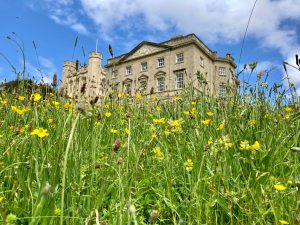
No Mow May is well underway at Bristol University with our Gardens & Grounds team joining legions of gardeners across the country to let wildflowers in lawns bloom, providing a feast of nectar for our hungry bees, butterflies, and wildlife.
More than 10 sites across campus, including Royal Fort Gardens, Queens Building, Arts and Social Sciences , Cantock’s Close, various halls of residence and small pockets of green will have their mowing relaxed to let the wildflowers in the lawn bloom throughout the month.
Mowing less saves wildlife
By creating these mosaic habitats in our cities and urban gardens, we can supplement the sharp decline of species rich meadows, which have an estimated loss of 97% since the 1930s, in our countryside and rural areas. University of Bristol’s Urban Pollinator research, led by Jane Memmott and Kath Baldock, has shown urban spaces are a vital source of nectar offsetting this decline. Also, recent findings looking closely at nectar quality by Ecologist Nicholas Tew highlights the pivotal role that species diversity has in supporting pollinators and promoting biodiversity in urban areas across our country. Put simply, mowing less saves wildlife.
Several of these no mow areas on campus will also continue to be managed carefully by our Grounds team and left to continue blooming through June and knee high through July, as meadows form a vital habitat for our campus’s wildlife and city centre over the summer months.
Our Hedgehog Friendly Campus team are also working in partnership with Gardens & Grounds as No Mow May is an important part of their work encouraging greater biodiversity on campus.
Put away your lawnmower on May 1st
Plantlife’s #NoMowMay campaign started in 2018 and the message is simple. Put away your lawnmower on May 1st or leave some patches of grass unmown in your own garden to save wildlife.
Every Flower Counts
At the end of the month, PlantLife invites us all to join in the nationwide Every Flower Counts survey. By counting how many flowers there are in a random square metre of lawn, you’ll receive a Personal Nectar Score, which tells us how much nectar the flowers producing and how many bees they’ll feed. See the PlantLife website for how to take part, either at home on your own lawn or in one of our #NoMowMay locations on campus.
